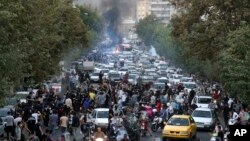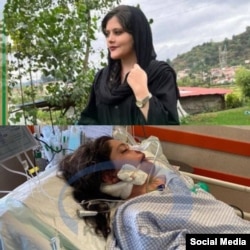Iran is responding with a violent, deadly crackdown to nationwide protests triggered by last week’s death in police custody of a young woman accused of not wearing her hijab properly, with authorities acknowledging at least six people have been killed in several days of unrest.
In comments published Wednesday, Iranian officials said four people were killed in violent incidents in the northwestern province of Kurdistan while two more were killed in rioting in neighboring Kermanshah province.
Iranian authorities blamed the violence on counter-revolutionary agents. But London-based rights group Amnesty International said Wednesday it has evidence that Iranian security forces have dispersed mostly peaceful protesters using unlawful methods, such as firing birdshot and other metal pellets, teargas and water cannons, and beating people with batons.
The Amnesty International report said the group recorded the killings of eight protesters by security forces on Monday and Tuesday, including four in Kurdistan, two in Kermanshah and two in West Azerbaijan province. It said the dead include six men, one woman and one child.
The rights group said hundreds more people, including children, have been violently arrested and sustained painful injuries from birdshot and other munitions.
"In some places, some protesters engaged in stone-throwing and damaged police vehicles. This in no way justifies the use of metal pellets, which is prohibited under all circumstances,” Amnesty International added.
Kurdistan province had been the home of 22-year-old Iranian Kurdish woman Mahsa Amini, who died in Tehran on September 16, three days after morality police arrested her for allegedly exposing too much of her hair in public as she visited the Iranian capital.
Amini fell into a coma shortly after being detained with other women at a Tehran police station and later died at a hospital, according to her family and the hospital. Her family accused authorities of physically assaulting her, but police denied mistreatment and said without sharing evidence that she had suffered a heart attack. Relatives said Amini had no history of serious medical problems.
Public protests against Amini’s death began last Friday in several parts of Iran and spread rapidly to other areas this week, reaching 23 of Iran’s 31 provinces as of Wednesday, according to social media videos posted by Iranian citizen journalists and compiled by VOA Persian.
Those provinces include Alborz, East Azerbaijan, Fars, Gilan, Golestan, Hamedan, Hormozgan, Ilam, Isfahan, Kerman, Kermanshah, Kurdistan, Markazi, Mazandaran, Qazvin, Qom, Razavi Khorasan, Semnan, South Khorasan, Tehran, West Azerbaijan, Yazd and Zanjan.
VOA cannot independently verify the circumstances of the protests seen in the videos because it is barred from reporting inside Iran.
Some of the social media videos contained footage of apparent anti-government protests by Iranian students in five universities on Wednesday, four of them in Tehran. They include the Iranian capital’s Allameh Tabataba'i University, Alzahra University, Islamic Azad University’s Science and Research Branch and University of Tehran, and Semnan University.
The sharing of such images via social media became harder for Iranians on Wednesday, as access to the popular American app Instagram was disrupted.
London-based internet monitoring group NetBlocks tweeted that Instagram access has been restricted on all major internet providers in Iran. It noted that the app, owned by U.S. company Meta, was one of the last available social media platforms in the country.
Iranian authorities repeatedly have cut off internet access in certain parts of the country or nationwide to try to quell previous waves of anti-government protests in recent years. There was no immediate Iranian government comment on Wednesday’s blockage of Instagram.
Exiled Iranians rallied in New York and Istanbul for a second consecutive day on Wednesday in solidarity with the protesters in Iran.
About 150 people joined a rally in New York’s Dag Hammarskjöld Plaza adjacent to the United Nations to denounce Iran’s Islamic rulers, including President Ebrahim Raisi, who addressed the world body’s General Assembly earlier in the day.
A VOA reporter at the rally held by the Organization of Iranian American Communities observed participants holding up pictures of Mahsa Amini and chanting her name.
Raisi did not mention the protests outside the U.N. building or in his home country in his speech. Instead, he said Iran’s Islamist leadership upholds human rights and rejects “double standards” of some governments whom he said focus “on one side and not on all [sides] equally.”
Another reporter in Istanbul saw a crowd of about 250 people rallying outside the Iranian consulate.
The participants included exiled Iranian women’s rights activist Nasiba Shamsaei, who cut her hair in memory of Mahsa Amini and in support of other women in Iran who have been doing the same in public and in social media videos posted in recent days.
Raisi has promised an investigation into her death.
This report was produced in collaboration with VOA’s Persian and Turkish Services. Tina Trinh reported from New York and Hilmi Hacaloglu and Umut Colak reported from Istanbul.





